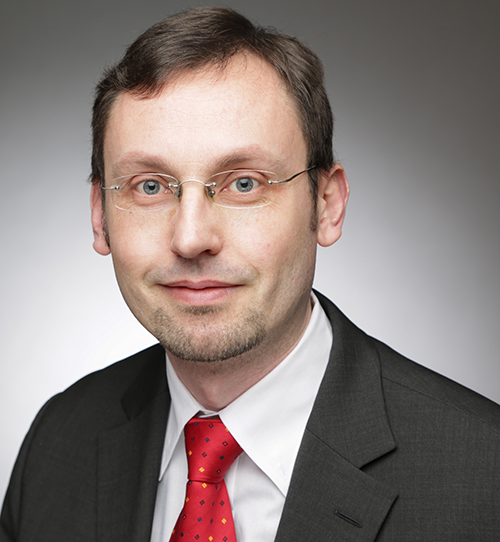Düsseldorf, 30.05.2019
Professor Christian Herder Receives Menarini Project Grant 2019
At the Diabetes Congress held this year in Berlin, the German Diabetes Association awarded Professor Christian Herder of the German Diabetes Center (DDZ) the Menarini Project Grant. Herder, head of the "Inflammation" research group at the Institute for Clinical Diabetology (DDZ) and scientist at the Department of Endocrinology and Diabetology (Faculty of Medicine, Heinrich Heine University Düsseldorf) received the award for his project "Prevalence, Determinants and Risk Factors of Sarcopenia in Patients with Recently Diagnosed Type 1 Diabetes and Type 2 Diabetes".
Sarcopenia is a condition characterized by the progressive loss of muscle mass, strength and function. It occurs not only with advancing age, but increasingly also in conjunction with diabetes. The aim of Professor Herder's project is to uncover the relationships between sarcopenia and diabetes. Muscles play a central role in the development of diabetes, as 80 percent of insulin-stimulated glucose uptake occurs in muscle tissue. Higher muscle mass is therefore associated with better insulin sensitivity and decreased muscle mass is associated with a higher risk of type 2 diabetes.
“In my research, I am very interested in the relationship between muscle mass and diabetes, and I hope that with the support of the Menarini Project Grant I will be able to identify new mechanisms that explain the progression of the disease,” said Professor Christian Herder at the award ceremony in Berlin. "With these findings, factors could be subsequently eliminated or minimized in order to avoid secondary diseases.” The project will be implemented within the framework of the German Diabetes Study, led by Professor Michael Roden, chairman of the DDZ and director of the Clinic for Endocrinology and Diabetology of the Medical Faculty and Düsseldorf University Hospital.
Brief Biography
Born in Düsseldorf, Christian Herder studied biology at Heinrich Heine University in Düsseldorf and at the University of Edinburgh from 1993 to 1999. After earning his PhD in Biochemistry at Johann Wolfgang Goethe University in Frankfurt am Main, he studied for a Master's degree in Epidemiology, which he was awarded in 2009 at Johannes Gutenberg University in Mainz. He completed his habilitation in Epidemiology in 2012 at Heinrich Heine University in Düsseldorf. The topic of his habilitation thesis was "Markers of subclinical inflammation as risk factors for type 2 diabetes: results from epidemiological cohort studies". He has been recognized with multiple awards for his research achievements: in 2007 with the Jühling Prize of the Anna Wunderlich-Ernst Jühling Foundation, in 2009 as Rising Star of the European Association for the Study of Diabetes (EASD), in 2013 with the Ferdinand Bertram Prize and in 2016 with the Hans Christian Hagedorn Project Grant of the German Diabetes Association.
After receiving his doctorate, Christian Herder worked as a research assistant at the DDZ in Düsseldorf from 2003 to 2006, where he has headed the "Inflammation" research group since 2007. A major focus of his work is the search for biomarkers in the blood that indicate an increased risk of type 2 diabetes and its complications at an early stage. These findings should enable a better understanding of the underlying mechanisms and help to more precisely predict the individual risk of disease.
The Menarini Project Grant has been awarded by the German Diabetes Association since 2001. The award, endowed with 15,000 euros, is linked to research work that is of particular relevance for the diagnosis and therapy of diabetes mellitus.
Diabetes Congress
The 54th Diabetes Congress was held under the motto “Diabetes – Not Only a Question of Type”. During the Congress, which took place in Berlin from May 29th to June 1st, around 7,000 physicians, scientists, diabetologists, people with the disease and other interested persons discussed the following topics:
- New diabetes classification – relevance for diagnosis and therapy?
- Diabetes: From prevention to remission
- Management of complications / comorbidities
- Gender and diabetes
- Environment, psychosocial stress and quality of life – challenges for society and policymakers
Link: www.deutsche-diabetes-studie.de
The German Diabetes Center (DDZ) serves as the German reference center for diabetes. Its objective is to contribute to the improvement of prevention, early detection, diagnosis and treatment of diabetes mellitus. At the same time, the research center aims at improving the epidemiological data situation in Germany. The DDZ coordinates the multicenter German Diabetes Study and is a point of contact for all players in the health sector. In addition, it prepares scientific information on diabetes mellitus and makes it available to the public. The DDZ is part of the Leibniz Association (Wissenschaftsgemeinschaft Gottfried Wilhelm Leibniz, WGL) and is a partner of the German Center for Diabetes Research (DZD e.V.).
For more information, please contact:
Christina A. Becker
Head, Press and Public Relations
German Diabetes Center(DDZ)
Leibniz Center for Diabetes Research
at the Heinrich Heine University of Düsseldorf
Phone: +49 (0)211-3382-450
email: Christina.Becker(at)ddz.de
Press contact

Birgit Niesing
niesing(at)dzd-ev.de
+49 (0)89 3187-3971

